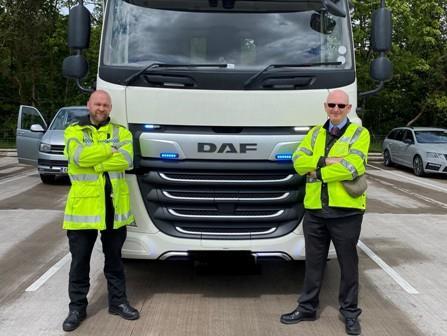
Nick Denton recently retired from his full time role as traffic commissioner (TC) for the West Midlands after 10 years regulating the road transport industry.
Quite rightly, he takes immense pride in the quasi-judicial role of TC, which is a far from easy balancing act of keeping Britain’s roads safe from rogues while allowing the 69,500 licensed HGV and 6,600 PSV operators to go about their legitimate business without the burden of unnecessary regulation.
Like judges, TCs can only apply the laws passed by government and Denton says the TCs have limited influence when it comes to setting policy and standards. That means TCs have very little room to interpret the regulations. “Basically we are here to enforce the law,” he says. “We don’t really have a major role in shaping policy though the DfT does consult us from time to time as we have a feel for how the policy is playing out and can offer ideas based on that experience.
“But it is their decision if they want to change the law or not.”
One area that TCs do have some discretion over is the thorny subject of financial standing.
“If financial standing cannot be shown, a TC may allow up to six months for an operator to demonstrate that it will be able to meet the requirements on a permanent basis,” explains Denton. “There are also many possible sources of finance which can be taken into account, including factoring agreements, loans, overdrafts etc.
“There is also some flexibility about how average funds are measured over a three-month period – it can be the average of the highest and lowest balance every month or the average closing balance every 10 days.
“We will always take the one which is most advantageous to the operator and apply common sense. If an operator needs to show funds of say £80,000 and can only show £78,000, then broadly speaking financial standing has been achieved. The cases where I have revoked because of financial standing tend to be where an operator needs to show £80,000 and can only demonstrate £3,000 over the past few months.”
The Office of the Traffic Commissioners in Leeds came in for some criticism for its slowness in dealing with applications and variations after the end of the Covid pandemic lockdowns but things are now improving. Despite going digital Denton says delays are often due to forms being incorrectly completed by the applicant.
“A large part of the reason for the time taken to issue licences is the 21-day objection period for statutory objectors. The Dutch issue licences in two or three days but to do that we would have to change the law,” says Denton. “Variations should still take seven or eight weeks, provided that the application form is filled in fully and correctly but too often this is not the case.
“Questions about previous convictions, previous licensing record or previous liquidations are too often answered inaccurately, prompting further correspondence and probably a reference to a TC for a decision. If I had a penny for every time I heard the words ‘that was an oversight’ I would be a millionaire.
“That said, service suffered during the pandemic but Leeds is now working hard to recruit and train new staff so it should be getting better. The long term solution is probably higher fees to pay for more staff to give a better service because O-licensing fees have stayed the same for more than a decade.
“Inflation has nibbled away at the fees and if people want a decent service they are going to have to pay for it. The application fee is small beer compared with other costs and I’m sure that many in the industry would rather pay more for a much better service.”
Fee structure

The flat structure of O-licence fees also needs addressing, Denton believes.
“It is argued that if you have 2,000 lorries you should pay more than someone with a single lorry,” he says. “There is a much greater administrative burden as every time they change a vehicle a new disc has to be issued. We have had no end of reviews of these sorts of issues in my time as TC but none have given rise to change.”
He is also frustrated that these numerous reviews have not led to any action on a number of other long-overdue changes.
“It’s pretty common ground that the requirements for advertising new operating centres need to be adjusted to bring them into the 21st century, that a pan-GB O-licence should be a possibility and that vehicle discs can be dispensed with,” he argues. “Various reviews have recommended them but there have been no changes in the 10 years I have been a TC.”
In 2009 the UK’s system of transport regulation was incorporated into EU law and since then all EU-based HGVs are in theory subject to the same level of regulation. In practice, however, Denton says the standards are “applied with varying degrees of rigour in different member states”.
“That was a great success for the UK because it took our approach to O-licensing and exported it to the rest of the EU,” he says. “Germany and the UK are at the top end of the spectrum for enforcement with some of the Eastern European states towards the bottom end.
“The fact that Germany’s environmental regulations are so strict means that to get to the UK a Romanian lorry has to meet quite high standards enforced rigorously by Germany. So we are protected from the fag end of the continental industry.
“UK industry could employ UK companies to carry their goods to and from the UK but they don’t because the foreign competition is cheaper. Part of the reason is lower wages and possibly lower standards in some areas as well.”
Despite caustic comments by former PM Boris Johnson while he was London mayor about the restrictiveness of EU drivers’ hours laws Denton says there are no plans to repeal them in the UK.
“Since Brexit there has been no appetite even amongst drivers for the UK to change its regulations on drivers’ hours – why would they want to work more hours?” he asks. “Have you ever tried driving for 10 hours and working for 15 hours a day?”
Transport manager training
As a transport manager CPC holder, Denton says it “crazy” that drivers are required to do regular refresher training under the EU Driver CPC rules but transport managers (TMs) are not.
“I can’t see the government imposing more regulation here so we do what we can to encourage regular refresher training for TMs,” he says. “We make it quite difficult for a new applicant with a transport manager who qualified in the 1990s with no training since, and we are unlikely to accept them until they have done a two-day CPC refresher course.”
While he cannot say whether or not the professionalism of drivers has been improved by the introduction of the Driver CPC in 2009 Denton does believe in the value of training.
“A lot of drivers and operators think it is a complete waste of time but I disagree,” he says. “If you select the right course it is valuable but I’ve come across drivers who have done the same course five days in a row just to meet the deadline and no wonder they are bored. If you do one day a year training who could object to that?”
There is no EU-wide regime for periodic maintenance inspections (PMIs) of trucks and trailers and UK operators tend to carry out much more frequent PMIs than their EU counterparts.
“Most, but by no means all, of the operators before me at public inquiries tend to operate HGVs between five and 20 years old,” says Denton. “There is no mandatory requirement for an operator to have inspections every six weeks and longer intervals of up to 13 weeks could be justified depending on mileage etc and provided that the vehicles don’t have long lists of defects when they do go in for inspection.
“It is important to retain the idea of a ‘preventative’ maintenance inspection which will identify developing issues and rectify them before they impair the roadworthiness of the vehicle. Remote diagnostics, though helpful, sometimes only identify issues once they become a problem.”
While there is no law saying drivers have to carry out a walkaround check before driving an HGV every O-licence requires drivers to report defects in writing.
“To do that they have to do a daily defect report basically,” Denton says. “If there are nil defects they don’t have to make the report but best practice is to write ‘nil defects’ so the operator has the comfort that the driver has done the checks.”

The DVSA often finds vehicles with serious defects such as broken mirrors and failed lights that have had ‘nil defects’ reports for several days before, but the TCs tend not to lay all the blame on drivers.
“That is so universal that if we suspended every driver who did that for a couple of days there wouldn’t be any drivers out there,” Denton says. “It is really up to management to manage that better. If they don’t then the drivers fall into the temptation of saying ‘it was OK yesterday so it’s going to be OK today’, jumping into the cab and ticking nil defects.
“Some operators have introduced apps which force the driver to take a few photos but they can still do that mechanistically. Many operators also do not have repair facilities on site to fix defects found by the driver. It is a conundrum how to deal with that.”
Denton has found that own account operators with restricted O-licences make up a large proportion of operators for whom ignorance rather than wilful non-compliance has brought then into his inquiry room.
“One might argue it is a too easy to get an operator licence – you just fill in a form and away you go,” he says. “They sign all these undertakings – the Ten Commandments as we call them – but they never properly look at them. Then they are surprised when they find themselves at PI two years later because they have never downloaded their drivers’ hours or have missed maintenance inspections.
“Everyone getting an O-licence gets three invitations to a new operator seminar that explains their obligations. Too many people either don’t turn up or don’t absorb the lessons. If they ignore all three invitations they will get a visit from the DVSA after 12 to 18 months and that is often when they are referred to me.”
He also finds it incongruous that even large own account fleets are not required to employ a qualified transport manager.
“If you are running a fleet of 15 or 20 vehicles on a standard licence you need a transport manager, so it doesn’t make much sense for the same fleet of 15 vehicles running on a restricted licence not to have a transport manager,” says Denton. “In the dim and distant past nobody needed a transport manager: when it was decided that for people carrying for hire and reward that requirement should be imposed, they left own account alone.
“In the skip industry a lot of people run on restricted licences because they say ‘we are carrying waste which is our own goods’. But recently we have taken a more robust attitude because it doesn’t really matter who the waste belongs to, they are carrying it for hire and reward. Unless they operate a big waste transfer station and transport is only a small part of the operation, they meet the criteria for hire and reward and so need a standard licence.”
Van O-licensing
From May 2022 all vans between 2.5 tonnes and 3.5 tonnes GVW needed to be covered by a standard international O-licence to transport goods for hire or reward between the UK and the EU including the Republic of Ireland. Take up has however been slow with only 423 licences issued for GB operators plus 17 in Northern Ireland.
But extending O-licensing to operators of the UK’s 4m domestic van fleet would see a “massive” increase in the TCs’ workload.
“That is not to say the industry doesn’t need more regulation of standards because the amount of vans found by DVSA to be overweight is something like 50% or 60%,” says Denton. “Their roadworthiness is also poor so they clearly don’t do walkaround checks and they are driven for all the hours God sends.
“I can understand government reluctance to move into regulating that area as there would be a massive step up in the resources necessary.”
Denton says there might be scope to introduce a light touch form of regulation for UK vans along the lines of the international scheme.
“They don’t have to have the same financial standing as HGV operators and the rules on operating centres are not as strict - but they do have to have a transport manager,” he says. “So there is a precedent that could easily be rolled out if regulation was to be brought down to vans without the full might of the O-licensing system. But van regulation is a political decision way above my pay grade.”
A long and high flying career

By the time he retired at the end of May 2022 Nick Denton had completed more than 37 years in the civil or public service, the last 10 being as traffic commissioner, first for London and the South East and then for the West Midlands. When he joined the then Department of Transport in January 1985, Nicholas Ridley was secretary of state and since then he has served under no fewer than 19 successors.
Denton’s pre-TC career was centred more on aviation than road transport, though he spent six months in the European Commission drafting common EU rules on seat belt wearing and MOT tests – rules which he fiercely opposed two years later as the UK’s transport negotiator in Brussels.
One of his lasting legacies was negotiating the rights for the first UK low-cost airline to fly to Eastern Europe: Go which flew from London to Prague. “Some years afterwards, wading through the litter and vomit in the Prague streets left by obviously British stag parties, I wondered what I had done!” he says.
In other trips abroad to negotiate landing rights for UK airlines Denton had to make sacrifices. “I had to pretend to eat cat in Yemen but perhaps my most unusual achievement was holding on for a score-draw in a compulsory slivovitz drinking competition with the CEO of Jugoslav Airlines in Belgrade in 1997,” he says, “which earned the caustic comment from the then director general of civil aviation ‘you have laid down your liver for your country’.” He then spent three years in Montreal as the UK’s representative at the International Civil Aviation Organisation.
As TC, Denton held over 2,000 public inquiries, revoked 550 operator licences and suspended or curtailed 750 more. “There have been 120 appeals against my decisions to the Upper Tribunal, only 18 of which were wholly or partially successful,” he says. “I have revoked or suspended around 1,600 HGV or PSV drivers’ licences for reasons varying from mobile phone offences to sexual assault and murder.”
Murder is not in fact a good enough reason to prevent someone holding an HGV operator or driving licence – it was actually a bus driver who was deemed unfit to continue in his role as a result of his conviction for matricide.
Although retiring as a full time TC, Denton has no plans to “take up golf, gardening or river cruises”.
He will act as a deputy TC in any of the eight UK regions that need him and has been appointed to the new Civil Aviation Authority independent review panel that will consider appeals by pilots and air traffic controllers who do not believe that the CAA has followed due process in suspending or revoking their licences.
“I also plan to be involved in a range of activities – transport manager CPC exam setting and marking, writing and delivering training courses, and auditing operators – which all have the common theme of aiming to make the road transport industry more professional,” he says. “When it comes to writing and marking CPC exams, I want to give more focus on what transport managers are expected to do on the front line. It is amazing, for example, that the current CPC training does not seem to go into the need to inspect and interpret maintenance records rigorously, download tachographs and look for missing mileage or how to manage drivers.
“I recall a conversation in the early 1990s with James Fells, the DfT assistant secretary in charge of road haulage policy, in which he explained that the forthcoming Goods Vehicle (Licensing of Operators) Act 1995 was designed to address the problem of the UK road transport industry’s long, underperforming, tail.
“While the situation today is undoubtedly an improvement on 1995, the number of operators who still come before me because they are operating vehicles out of tax, out of MOT, driven by drivers without the required entitlement, in a poor roadworthy condition or because they do not understand how to monitor drivers’ hours, is quite depressing. There is still a lot to do!”
Same old offences
After a decade as a TC, Denton finds it immensely frustrating that it is the same offences that tend to bring operators and drivers into his inquiry room.
Drivers using mobile phones. “Fines and penalty points have doubled but still they do it,” he says. “What is it going to take to get the message through that you should not drive while texting, phoning, looking at your device?”
Drivers removing their tacho card and driving, in order to conceal sometimes minor drivers’ hours offences. “The risks of doing so are huge: a four-week suspension for each offence and 12 months disqualification for more than six offences,” he says. “But they still take the chance, sometimes, though not always, under pressure from the operator.”
Operators who get a goods vehicle operator licence and proceed to run HGVs without the slightest idea of how they are required to manage them. “The TCs have tried various initiatives including making the DVSA new operator seminars punchier and more user friendly and producing a laminated card which summarises on one page in simple terms what an operator is supposed to do,” Denton says. “I have tried some different things to get the message across to those who need to hear it. I have posted on [drivers’ forum] Trucknet to reach drivers directly with a pretty mixed response and have appeared on a UK-based Sikh TV channel widely watched in the West Midlands to reach out to the large community of Sikh operators in that traffic area.
“I have addressed countless conferences, training events and seminars in an attempt - clearly not wholly successful - to keep drivers and operators out of my inquiry room. But the seeds have been cast on pretty stony ground.”
Earned Recognition is a positive development but too early to say if it’s working
In 2018 the DVSA launched Earned Recognition, a voluntary scheme designed to let operators able to show an exemplary record on drivers’ hours and vehicle maintenance get on with their business without the inconvenience of their vehicles being stopped in routine roadside inspections.
“The concept is excellent,” says Denton. “If you have good enough compliance systems to warrant Earned Recognition you are not over-regulated. It is also true that if you don’t have Earned Recognition but are nevertheless green/green on your OCRS you are much less likely to be stopped than a red operator.”
The aim of Earned Recognition is to free DVSA resources to focus on the serially and seriously non-compliant operators.
“Some cowboys do operate under the radar without licences and it would be good to see more resources deployed to identifying their vehicles and impounding them,” says Denton. “There is tentative evidence of more referrals of bad operators to TCs, and I have been conscious of an uptick in references from DVSA over the last few months, but it is hard to identify the precise reason for that.
“It could be that the end of Covid is releasing more examiners onto the roadside or it could be Earned Recognition or it could be a bit of both.”














